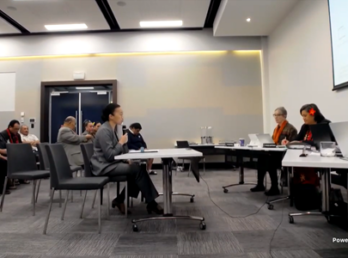Lawyers urged to upskill on ‘virtual assets’ articles
Date
14 Sep 2021
Related Expertise
Written by Diana Clement for ADLS Law News Issue 31, dated 10 September 2021. Republished with permission.
Cryptocurrency is all the rage. But how – and should – it be regulated and is our law fit for purpose?
These are the questions Parliament will grapple with as it gets to grips with an inquiry into the current and future nature, impact and risk of cryptocurrencies. Submissions closed earlier this week.
The inquiry, by the Finance and Expenditure Committee, is considering the nature and benefits of cryptocurrencies, the risk they pose to the monetary system, financial stability and users, how they are used by criminal organisations and to establish whether they can be adequately regulated. These issues affect a wide range of lawyers from family to insolvency and everything in between. Even if they don’t know it.
Other countries’ regulators are also becoming worried. The Economist recently reported that 12 years after bitcoin was born, governments were still struggling with cryptocurrencies. Britain has banned Binance, a crypto exchange, and the EU’s regulators want transactions to be more traceable.
On 3 August Gary Gensler, the head of the US Securities and Exchange Commission, said cryptocurrency markets were “rife with fraud, scams and abuse” and called on Congress to give his agency new regulatory powers.
Governments, The Economist said, have an obligation to fight the deception, tax evasion and money laundering that plagues the crypto world. “Police seizures of bitcoin suggest they are becoming more zealous. The harder issue they must grapple with is whether cryptocurrencies threaten the financial system.”
Crypto is not just currencies. There is a growing market behind the scenes around virtual assets, says Binu Paul, specialist lead, FinTech at the Financial Markets Authority (FMA).
In fact, the word ‘crypto’ is something we should leave behind, according to Lloyd Kavanagh, financial services partner at MinterEllisonRuddWatts. “The better term is ‘virtual assets’.” These are fast becoming part of mainstream business, not something traded illicitly on the dark web, and are a legitimate asset class that has entered the mainstream, Kavanagh says. “It’s really important that lawyers, journalists, politicians, government officials and businesspeople understand it.”
The growth of virtual assets makes the subject relevant to lawyers in a wide variety of disciplines such as mergers and acquisitions, insolvency, family, estate planning, tax and the environment, says James Cochrane, a partner at Stace Hammond.
All lawyers should be considering the issues, adds Kavanagh. Too often there is a disconnect between those in the know who see the big picture and business opportunity, and the rest of New Zealand which hears the word ‘cryptocurrency’ and thinks of the dark web.
Terms of reference
Kavanagh says it’s essential the select committee considers the bigger issues for the business world. “We are in a period of transformation and coming into a new age. Digital assets and mediums of exchange are having an increasingly important role, and we need to have the appropriate balance of regulation so New Zealand can participate,” he says.
“I do have a few concerns with the [inquiry’s] terms of reference. You could read them as having a somewhat negative frame.” He accepts there are concerns about crime and the misuse of virtual assets but says cash can also be misused.
He contrasts the terms of reference in New Zealand’s inquiry with those of the Senate Select Committee in Australia.“ Australia is talking about enhancing [its] economy and environment for business while our politicians are still asking what a cryptocurrency is.
“It’s important that New Zealand develops additional lines of business activity that employ New Zealanders and we export their services, which can be carbon-light compared to, or in addition to, our traditional activities.
“That’s one of the really useful things about having the select committee, provided that the terms of reference are wide and not seen as just a narrow compliance issue. It’s actually about building New Zealand’s economy to be a better place and exporting services rather than exporting our best people to do their work in Australia or Singapore or the US. Hopefully, despite the potentially negative terms of reference, it will take a broad positive view about the part virtual assets can play in the New Zealand economy.”
Legitimate business
Increasingly, New Zealand business is taking an interest in virtual assets. For example, Greymouth-based Ruby Play Network is raising equity through online investment market Snowball Effect in an offer where investors will get a mixture of equity and decentralised RUBY token rights.
It’s not the only start-up looking to launch virtual asset-related products here. The FMA’s Paul chairs the FinTech group of the Council of Financial Regulators. Earlier this year members of the council, which includes the FMA, Inland Revenue Department, Commerce Commission, Treasury and MBIE met with the Department of Internal Affairs (DIA) and 26 start-ups, around 14 of which have businesses related to virtual assets, says Paul. All were seeking guidance from the regulators.
“So, there’s a lot of activity where people are looking to experiment, looking to innovate in that space,” Paul says. “It will take time for them to have a product that’s in the market, but it’s happening.”
Legal advice
Virtual assets touch more areas of the law than just financial services and crime, Cochrane says. “As legal advisors, we are cognisant of the expanding pervasiveness of crypto assets, throughout the global financial and commercial landscape, and the impact this has [or will soon have] on legal advice.”
Kavanagh points to the FMA-Retail- Investor-Platforms-Research, a survey which, amongst other things, found 28% of investors have some form of virtual asset holding and 34% intend to be investing by next year. “That will make it highly relevant that all lawyers, especially those working in trusts and estates, or relationship property, have some understanding of the topic.”
Cochrane says virtual assets will increasingly impact on the work of relationship property lawyers. “What are the tax implications if you were to do a separation agreement? And, for estate planning lawyers, how does a person ensure their anonymous virtual assets pass down to their beneficiaries? Who holds the key to the wallet? Without it, the money is lost.”
He says a growing number of New Zealanders hold virtual assets and any lawyer who needs to do client and anti- money laundering (AML) due diligence will increasingly need to consider virtual assets.
“Is that a scam, [or a] suspicious transaction? How do you deal with [potentially] tainted coins? If you’re acting for the vendor in a transaction, you might want to insist that the transaction goes through a regulated exchange to avoid putting the client at risk of AML implications.”
In mergers and acquisitions, for example, lawyers need to be mindful when conducting virtual asset-related due diligence to ensure clients are adequately protected and are not breaking the law.
It also touches insolvency. Cochrane cites the New Zealand High Court decision in Ruscoe & Moore v Cryptopia Limited 2020 (in liquidation) [2020] NZHC 728. The application concerned the competing interests between Christchurch-based exchange
Cryptopia’s account holders and creditors.
Being a novel case for New Zealand, Cryptopia’s liquidator Grant Thornton New Zealand filed an application to the High Court, seeking directions (under s 248 of the Companies Act 1993) about the legal status of virtual assets in New Zealand.
The High Court determined that virtual assets are property, although not legal tender, which is in line with decisions in the United States and has
implications for taxation, Cochrane says.
The case, adds Kavanagh, shows the ‘wonderful flexibility’ of common law and the New Zealand courts, which had to grapple with an entirely new environment.
In April this year, the owner of a Waiheke property became the first home bought using Bitcoin. Property lawyers will begin to see virtual asset transactions appear frequently. These examples show how virtual assets have come in from the cold and are now viewed by the mainstream as an asset class, Cochrane says.
Not legal tender
Few countries so far have declared virtual assets to be legal tender. This creates an issue with businesspeople who have made large sums of money in virtual assets and want to use that money to start business here and employ people.
Virtual assets have just become legal tender in El Salvador (alongside the US dollar) and other Latin American countries could follow suit.
Tonga is another, thanks to Mata‘i‘ulua ‘i Fonuamotu, Lord Fusitu‘a, a member of the royal family and Tonga’s Parliament, who is a huge advocate of virtual assets. Tonga, like many countries, relies heavily on remittances from its diaspora, but a good chunk of those funds are lost to remittance companies. Lord Fusitu’a has been quoted as saying he believes that by embracing virtual currencies Tonga can become more competitive and wealthier. Spanish lawmakers are backing legal initiatives to legitimise the cryptocurrency for mortgage and insurance purposes.
Work in progress
Jurisdictions around the world are coming to terms with virtual assets and it’s less wild west and more like a work in progress in 2021.
The market is not completely unregulated in New Zealand. Applicable laws include the Financial Markets Conduct Act 2013 (FMC Act), the Anti-Money Laundering and Countering Financing of Terrorism Act 2009 (AML/ CFT Act), and the Financial Service Providers (Registration and Dispute Resolution) Act 2008.
For virtual assets and services to fall under the FMA’s remit the providers must be domiciled in New Zealand, Paul says. If not, investors are not protected by New Zealand law, even if they are taxed here.
New Zealand has only four categories of financial products: equities, bonds, managed investment schemes such as funds and derivatives, which need a licence from the FMA. If a virtual asset had the form and function which made it resemble one of these four categories, it would need to be licensed, says Paul. Each product is considered individually.
Even if the product can’t be regulated, a New Zealand company providing a financial service needs to be registered on the Financial Service Providers Register (FSPR), says Paul. Consequently, the provider needs to belong to a dispute resolution service such as the Insurance & Financial Services Ombudsman or Financial Services Complaints Limited.
Some areas of the law need to be modernised, Kavanagh says. One example is the Anti-Money Laundering and Countering Financing of Terrorism Act 2009 (AML/CFT Act), which many lawyers grapple with.
The OECD’s Financial Action Task Force (FATF) noted in its recent review that New Zealand’s regime needs work. Relevant parts of the legislation were drafted in 2009. The DIA has issued various forms of guidance, but they don’t connect well to the legislation, says Kavanagh.
Tax implications
The decentralised nature of virtual assets poses an issue for tax authorities.
The IRD has no special tax rules for virtual assets. It does, however, provide guidance to taxpayers thanks in part to Ruscoe & Moore v Cryptopia where the court ruled that virtual assets are property. That allowed the IRD to treat virtual assets accordingly. Tax is applied when the currency is bought or sold, rather than on unrealised gains. It’s not necessary to cash it out for a tax obligation to exist. That makes it similar to property.
The fact that it’s taxed like property means it will probably be slower to be adopted, Cochrane says. No-one will go out and buy a coffee with bitcoin if it creates a taxable event every time. “There’s a lot of complexity when you come to thinking about your tax.”
Balancing act
The select committee considering cryptocurrencies will need to tread careful. Too much regulation could stifle innovation, meaning New Zealand could miss out on a huge opportunity, say both Cochrane and Kavanagh.
“If it’s too complex. If it’s too scary. If the law is not fit for purpose. Then we’re potentially going to stifle innovation, and we are going to miss out on a huge opportunity for New Zealand to grow its productivity as a nation in the tech space,” says Cochrane. “If you overregulate, then another nation will just pick it up. It’s like Whack a Mole. If you ban all the mining in China, it just moves.
“I would like to see a balanced approach. I would like to see that they are not just looking within New Zealand,” he says.
“My concern would be that we have legislation that is viewed as an opportunity to tax. And that stifles innovation in this sector.”
The final word goes to Kavanagh who wants to point out that although bitcoin is energy-hungry, other newer assets such as ether (which uses the ethereum technology) are more efficient.
Disclaimer: This article not intended as legal advice and it should not be considered or relied on by any reader as such. Like most aspects of law, each crypto legal issue must be considered by reference to its own facts. Stace Hammond do not profess to be experts in any other field discussed in this paper, e.g. economics, financial advice, accounting. The article should not be treated as professional advice of any kind (e.g. legal, accounting, tax, or financial advice). It is for educational purposes only. Please note that the material linked in the article is for illustrative purposes only. Its inclusion is intended to make the paper accessible for all readers, not just lawyers. Except for our own web articles, Stace Hammond does not necessarily agree with or endorse the statements made in the linked material. We reference it for its overall usefulness for this discourse. Stace Hammond does not claim any copyright or other intellectual property rights in those linked works. We also reserve the right to correct any errors in the article that we discover.
Subscribe
Get insights sent direct to your email.




















